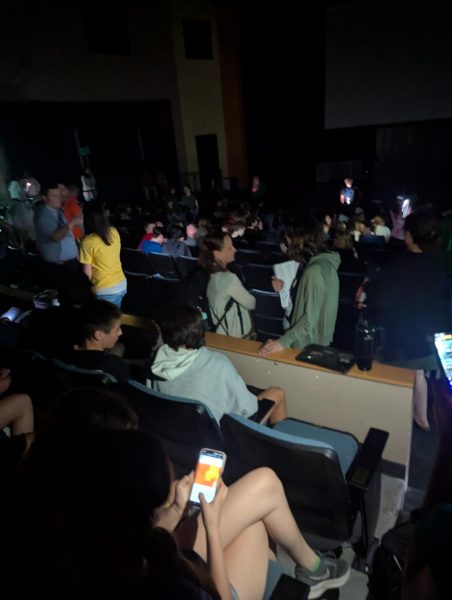Proposed Rule 15 And Public Libraries: Censorship in Missouri
All across America, the extreme right has been gaining power. White supremacists openly march the streets and sit in the halls of our government, politicians pull stunts with human lives in order to stir up their voter bases, and mass shootings targeting minorities are committed on a monthly basis. Hate crimes have increased 25.3% over the last 10 years, with 5,800 hate crimes reported in 2012 and 7,300 reported in 2022. (The US population has increased by 5.7% since 2012; this is wildly disproportionate.) All of these are overt and tragic symptoms of the gains in power made by the extreme right, but one, more subtle, effect has been growing across the US. Censorship laws are on the rise in red states, usually targeting schools, libraries, or the internet, disguised in the false goal of “protecting the children”. These aim to harm the education of the public, making them more receptive to the illogic of the extreme right. The most well known of these laws, such as the “Don’t Say Gay” law, have been passed in Florida and Texas, but they are not contained to those two states, or even to the Deep South in general. Censorship is alive and well in Missouri as well.
On October 14th, 2022, Missouri Secretary of State Jay Ashcroft proposed a new rule for state-funded public libraries. This rule is known, for now, as ‘proposed rule 15 CSR 30-200.015’. If implemented, the rule would require public libraries to undertake many policies which would stop certain subject matter from being freely accessible in the library. This would be accomplished in a variety of ways; most egregiously, the rule says that libraries must refrain from using state funds to “purchase or acquire any materials in any form that appeal to the prurient interests of any minor”. This is coded language; “the prurient interests of any minor” is an excuse to outlaw purchasing any children’s or young adult books dealing with gender or sexuality, a ban similar to those we’ve seen implemented across the country. Similarly, the rule would prevent libraries from “knowingly display[ing]” any “age-inappropriate materials in any form . . . in areas designated by the library as containing materials predominantly for minors.” This would reinforce the censorship of any children’s or YA books containing queer characters or relationships, while also censoring anything and everything considered “age-inappropriate”, including discussions of race, inequality, or accurate American history. Says former librarian Renée Payton: “Rules, legislation and school policies that restrict access to information are unbelievably harmful for all people, especially marginalized people. Not everyone is a white, heterosexual Christian living in a comfortable suburban home.”
Altogether, these censorship measures would isolate queer children and children of color, foster ignorance in cis-het white children, and overall make things much more dangerous for the marginalized people of Missouri.
Proposed Rule 15 CSR 30-200.015 would also allow everyday citizens to participate in censorship. The rule, if implemented, would allow parents to decide which books their children are or are not allowed to read, and librarians would be in violation of the rule if they were to “knowingly grant access to any minor any material in any form not approved by the minor’s parent or guardian”. This would allow parents to control the information their children are allowed to know, a very dangerous thing when one considers that abusive parents often seek to control their children’s knowledge. Says Freshman Kat Walker of CHS: “I understand if you are a parent who doesn’t want your child reading Fifty Shades of Grey, but you have to understand the consequences a law like this would have on the diverse perspectives children will be able to read.”
Rule 15 would not just allow people to control what their children are allowed to read, but what everyone’s children are allowed to read. The rule would allow “any person [to] dispute or challenge the library’s age-appropriate designation affixed to any presentation, event, material, or display in the library, and the results of any such dispute or challenge shall be disclosed to the public and published on the library’s website.” This is, of course, incredibly dangerous. This would allow any person with any vendetta to challenge the library’s designation of a book, and possibly succeed in getting it deemed “age-inappropriate” and thus censoring it. Says Renée Payton: “I (. . .) take issue with the fact that ‘any person may dispute or challenge the library’s age-appropriate designation’ and that libraries must record and publish each dispute/challenge on their website. Libraries across the country have received complaints from far outside their service areas. These complaints are usually promoted online and almost exclusively target racial minority and LGBTQ+ materials. Libraries should not have to respond to complaints from people who aren’t members of the communities they serve.”
These measures are especially dangerous in a political climate rife with hatred, division, and conspiracy theories, all of which can be combated with education. Allowing the creation of a real-life echo chamber will deprive countless children of the opportunity to learn outside of their parents’ biases. Says Kat Walker: “Books are meant to expand your worldview and expose you to different cultures and walks of life, but by restricting what children and teenagers are able to read, so many diverse authors and voices are lost.”
This rule also contains one more, very targeted clause: “No event or presentation shall be held at the library without an age-appropriate designation affixed to any publication, website, or advertisement for such event or presentation.” This clause is, at face value, confusing; what events could be held at a public library which would require age segregation? However, this clause is almost certainly targeting one type of event in particular: Drag Queen Story Hours, the extreme right’s new favorite scapegoat. According to those on the extreme right, children should not have any contact with gender non-conformity or queerness, because they are “adult” subjects. This is untrue, but it is an unfortunately popular opinion, popular enough that a clause such as the one in Rule 15 could call into question the legality of Drag Queen Story Hours at state-funded public libraries in the state of Missouri. This particular clause cements Proposed Rule 15 as a tool of censorship in the so-called “Culture War”.
Proposed Rule 15 would enforce its clauses through the revocation of funding, which would disproportionately affect small libraries, as said by Renée Payton: “Small library systems, those with one library like Ferguson or Webster Groves have small budgets and fewer sources of funding. I worry that those libraries will have to choose between accepting funds from the state, which will restrict their purchasing choices, and struggling to find other sources of funding because they don’t want to adhere to this restrictive rule.”
Thankfully, it seems public opinion in Missouri is against Rule 15. Over 18,000 comments were submitted during the public comment period for Rule 15, and judging by Secretary Ashcroft’s negative comments on the matter, it can be estimated that a majority were unsupportive of the rule. CHS students reflected this opposition; says Freshman Lily Evans: “I am against banning books. People should have access to whatever books they want. Plus, modern laws like this usually target queer literature, deeming it ‘inappropriate’ without good reason.”
Freshman Kat Walker shared similar views: “I am against this proposed rule. (. . .) This [rule] would especially target queer authors and their stories from reaching new generations, after we have seen the government classify LGBTQ+ media as ‘inappropriate for children’ and ‘too sexual’, even though books and movies about straight couples are still heavily pushed in children’s media. I am very disappointed in the rise in legislation like this across the country. I have never liked adults being unnecessarily overprotective of children, especially when there was barely a problem in the first place.”
However, in the era of gerrymandering and attempted coups, public opinion on the government seems to mean little. The rule is still in danger of passing, though the danger is not as dire as it could be.
What would the consequences of this rule being implemented be for students of Clayton High? As the majority of CHS’s student body is under the age of 18, the majority would be subject to the rule’s clauses governing minors. Therefore, their reading choices would be dictated by their parents and the state, censoring many books that they may wish to read. Anyone could dispute a book’s age designation in any library and make it suddenly inaccessible to those under 18, meaning many books you may want or even need to read for research may become unavailable to you. Says Renée Payton: “Whether or not you use libraries, rules like these will affect your life. Similar rules, policies, and laws are in place that restrict freedom and marginalize people. If others don’t have rights or lose them, then your rights might be taken away some day.”
What can be done to fight this proposed rule? According to Renée Payton: “The public comment period was open from November 15th through December 15th. No public hearing is scheduled. Contact the Missouri Library Association, ACLU of Missouri or your local library about the action/advocacy efforts surrounding this rule and other censorship efforts.”
A $50 or more donation includes a subscription to the Clayton High School Globe 2024-2025 print news magazine.
We will mail a copy of our issues to the recipients of your choice.
Your donation helps preserve the tangible experience of print journalism, ensuring that student voices reach our community and that student democracy thrives.

Ezri Perrin is a senior at Clayton High School and a reporter for the Globe. They have been with the Globe since freshman year. They are passionate about Star Trek, human rights,...











